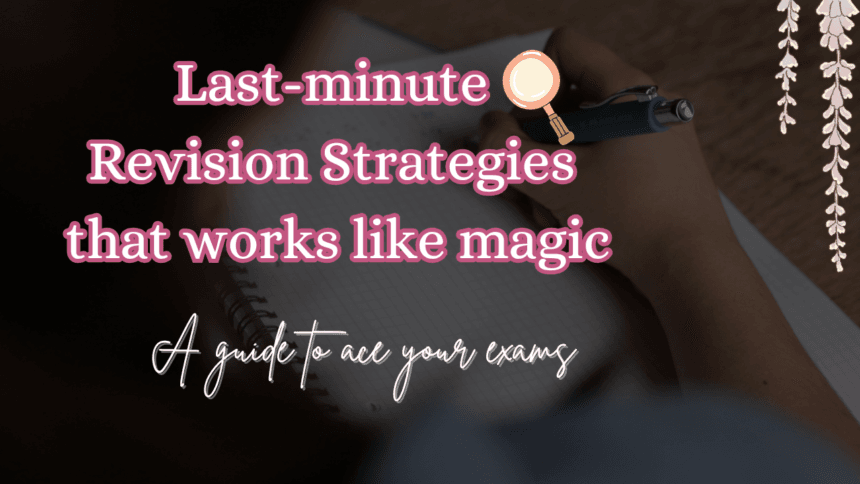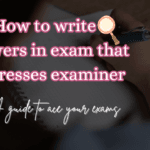Exams are approaching, and you may feel pressured to complete syllabus properly in the little time available. While last-minute is not ideal, effective tactics can help you remember important knowledge and gain confidence. This essay will walk you through efficient last-minute revision strategies for improving your performance.
Prioritize important topics
This revision strategy focuses on most important topics.
Not all topics are weighted equally in tests.
Identify the most significant ones using:
Syllabus weightage – Look through previous question papers to identify which topics are commonly asked.
Your weak points – Concentrate on subjects that you struggle with rather than reviewing what you already know.
High-scoring portions – Definitions, formulae, and direct inquiries are examples of topics that yield easy marks.
How To Do It?
Make a list of important subjects.
Divide them according to the difficulty level and time necessary for review.
Begin with high-priority issues and progress to less critical ones when time permits.

Use summary notes and flash cards
When it comes to last-minute revisions strategies, handwritten notes and flashcards come in handy.
They reduce voluminous material into brief, clear statements that are simpler to remember.
How to Use Them?
Review your class notes, underlined points, and textbook summaries.
Use flashcards to memorize formulae, definitions, and essential ideas.
To help with memory retention, read aloud or quiz yourself.
Tip: If you don’t have pre-made notes, use internet summary notes or ask friends who have well-organized notes.
Follow 80/20 rule (pareto principle)
The revision strategies of 80/20 Rule claims that 80% of test questions are derived from 20% of the curriculum.
Instead of attempting to cover everything, concentrate on the 20% that matters the most to your grade.
How do you go about implementing?
Look through prior years’ question sheets and highlight the most commonly asked questions.
Instead than focusing on little details, review key ideas, definitions, and essential theories.
Spend less time on less important issues.
Use active recall for quick memorization
Active recall is a very efficient learning strategy in which you challenge yourself rather than just re-reading the content.
How To Do It?
After finishing a topic, close the book and review the major points.
Without glancing at your notes, write down what you recall.
Use the “Question-Answer” approach by asking yourself a question and attempting to answer it from memory.
Why Does It Work?
Active recall improves memory and facilitates retrieval during tests.
Solve previous year papers and mock tests
Another revision strategies is that,Practicing actual test questions is critical for understanding the format, difficulty level, and time constraints.
How to Use Them Effectively?
Set a timer and attempt the paper under exam conditions.
Analyze errors and improve weak areas.
Concentrate on commonly asked questions and top-scoring themes.
Tip: Solving at least 3-5 old papers helps increase confidence and accuracy.
Use mnemonics and visual techniques
Memory techniques of revision strategies such as mnemonics, acronyms, and visuals can help you recall difficult material rapidly.
Examples: Mnemonics: “My Very Educated Mother Just Served Us Nachos” (Mercury, Venus, Earth, Mars, Jupiter, Saturn, Uranus, and Neptune).
SOH CAH TOA is an acronym for trigonometric ratios (sine = opposite/hypotenuse, cosine = adjacent/hypotenuse, and tangent = opposite/adjacent).
Visualization: To improve retention, convert knowledge into visuals, mind maps, or flowcharts.
Follow the 50/10rule for efficient study
Instead of studying for hours on end, take small breaks to keep your brain engaged.
How to Use It?
Study for 50 minutes with complete focus.
Take a 10-minute pause (walking around, stretching, and drinking water).
Repeat the cycle for 2-3 hours, then take a longer rest.
Why Does It Work? Short pauses improve the brain’s ability to absorb and remember information.
Teach someone else or read out loud
Explaining concepts to others requires you to simplify and recollect knowledge more efficiently.
How To Do It?
Teach a friend, sibling, or even oneself (talk loudly).
If no one is accessible, videotape yourself explaining and listen back later.
Use the Feynman Technique: teach as if you were explaining to a five-year-old, simplifying topics.
Why Does It Work? Teaching reinforces comprehension and increases retention.
Also check, time management for students
Stay away from new topics
Trying to grasp new ideas at the last minute may be confusing and stressful.
What Should I Do Instead?
Strengthen previously learned concepts. Revise the formulae, definitions, and significant aspects.
If required, scan the synopsis of new subjects rather than delving further.
Tip: Trust your preparations and prevent last-minute worry.

Take care of your health and sleep well
Many students make the mistake of sacrificing sleep and health for last-minute studying, which can backfire.
Best practices for exam day preparation
Get at least 6-7 hours of sleep before the exam to keep your thoughts clear.
Eat light, healthy meals (avoid junk food and heavy dinners).
Stay hydrated to ensure that your brain functions correctly.
Excess caffeine might cause anxiety.
Why Is It Important? A well-rested brain retains knowledge and concentrates more effectively.
Stay calm and manage exam anxiety
Stress can impair your recall, so be cool and confident.
Quick Relaxation Techniques: Take deep breaths for 5 minutes.
Take a quick stroll or do some mild stretching.
Listen to soothing instrumental music to unwind.
Visualize yourself completing the exam successfully.
Tip: Believe in yourself! A good mentality can improve performance.
conclusion
Last-minute revision might be stressful, but smart revision strategies topic prioritization, flashcards, solving past papers, active recall, and following good study cycles can help you learn more in less time.
Stay cool, confident, and well-rested, and you will do your best in the exam.









